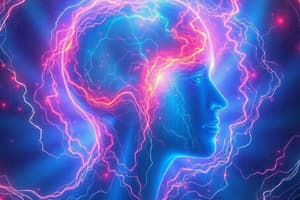Podcast
Questions and Answers
What is the core process behind the transformation of a neutral stimulus into a conditioned stimulus?
What is the core process behind the transformation of a neutral stimulus into a conditioned stimulus?
- Repeated connections with an unconditioned stimulus (correct)
- Stimulus discrimination
- Spontaneous recovery
- Stimulus generalization
When a person exhibits a conditioned response to stimuli similar to the original conditioned stimulus, what concept is being demonstrated?
When a person exhibits a conditioned response to stimuli similar to the original conditioned stimulus, what concept is being demonstrated?
- Spontaneous recovery
- Stimulus generalization (correct)
- Systematic desensitization
- Discrimination learning
A patient who initially fears surgery experiences a return of this anxiety upon seeing medical instruments again after a long period. Which concept is best illustrated by this scenario?
A patient who initially fears surgery experiences a return of this anxiety upon seeing medical instruments again after a long period. Which concept is best illustrated by this scenario?
- Discrimination learning
- Stimulus generalization
- Systematic desensitization
- Spontaneous recovery (correct)
What learning process enables an individual to respond differently to similar but non-identical stimuli?
What learning process enables an individual to respond differently to similar but non-identical stimuli?
Which of the following describes the process of gradually reducing the fear by facing it bit by bit?
Which of the following describes the process of gradually reducing the fear by facing it bit by bit?
If a dog salivates at the sound of a specific bell, but also salivates somewhat to similar sounding chimes, what concept is being demonstrated?
If a dog salivates at the sound of a specific bell, but also salivates somewhat to similar sounding chimes, what concept is being demonstrated?
What concept explains why a person with diabetes can tell the difference between feeling tired and feeling the specific symptoms of low blood sugar?
What concept explains why a person with diabetes can tell the difference between feeling tired and feeling the specific symptoms of low blood sugar?
A person's fear of a specific insect resurfaces after several years, even when the person had no recent encounters. What does this scenario exemplify?
A person's fear of a specific insect resurfaces after several years, even when the person had no recent encounters. What does this scenario exemplify?
Which of the following best describes the process of systematic desensitization?
Which of the following best describes the process of systematic desensitization?
In operant conditioning, what is the role of a reinforcer?
In operant conditioning, what is the role of a reinforcer?
How does escape conditioning differ from avoidance conditioning?
How does escape conditioning differ from avoidance conditioning?
According to cognitive learning theory, what is the primary driver of learning?
According to cognitive learning theory, what is the primary driver of learning?
What does the concept of 'going back to the old environment' imply in behavioral change?
What does the concept of 'going back to the old environment' imply in behavioral change?
Which factor is NOT considered a major element in motivation?
Which factor is NOT considered a major element in motivation?
What is the role of an educator, according to provided text?
What is the role of an educator, according to provided text?
What does it mean when someone uses humor to stop being bullied?
What does it mean when someone uses humor to stop being bullied?
Which statement best defines 'learning' according to the provided text?
Which statement best defines 'learning' according to the provided text?
Which of the following best describes the function of learning theories?
Which of the following best describes the function of learning theories?
In behaviorist learning theory, what is the primary focus for changing behavior?
In behaviorist learning theory, what is the primary focus for changing behavior?
According to behaviorist theory, which of the following primarily serves as the motivator for learning?
According to behaviorist theory, which of the following primarily serves as the motivator for learning?
What is the role of the educator when applying behaviorist learning theory?
What is the role of the educator when applying behaviorist learning theory?
Which statement accurately describes ‘respondent conditioning’?
Which statement accurately describes ‘respondent conditioning’?
What is the role of 'transfer' in the context of behaviorist learning theory?
What is the role of 'transfer' in the context of behaviorist learning theory?
What is a practical application of psychological learning theories?
What is a practical application of psychological learning theories?
What is the focus of motor learning in comparison to psychological learning?
What is the focus of motor learning in comparison to psychological learning?
What is one way that 'unlearning' is explained in the content provided?
What is one way that 'unlearning' is explained in the content provided?
In Freud's theory, which component of personality operates on the reality principle?
In Freud's theory, which component of personality operates on the reality principle?
Which of the following is NOT considered a defense mechanism according to the provided text?
Which of the following is NOT considered a defense mechanism according to the provided text?
A significant amount of adult behavior is rooted in:
A significant amount of adult behavior is rooted in:
What does the text suggest about Erikson's stages of psychosocial development?
What does the text suggest about Erikson's stages of psychosocial development?
In the context of neuropsychology, learning is viewed as involving:
In the context of neuropsychology, learning is viewed as involving:
Which of these factors affect learning?
Which of these factors affect learning?
Within a Humanistic Learning approach, the primary focus is more on:
Within a Humanistic Learning approach, the primary focus is more on:
Which of the following is NOT something a humanistic educator would focus on?
Which of the following is NOT something a humanistic educator would focus on?
Which best describes the cognitive stage of motor learning?
Which best describes the cognitive stage of motor learning?
What is most likely to interfere with or stimulate learning?
What is most likely to interfere with or stimulate learning?
What is crucial for forming strong learning connections?
What is crucial for forming strong learning connections?
What is a defining characteristic of the autonomous stage of motor learning?
What is a defining characteristic of the autonomous stage of motor learning?
What is the key difference between massed practice and distributed practice?
What is the key difference between massed practice and distributed practice?
Which learning theory emphasizes the importance of extrinsic rewards and external incentives?
Which learning theory emphasizes the importance of extrinsic rewards and external incentives?
According to the content, which approach to learning suggests that individuals actively 'mediate' information?
According to the content, which approach to learning suggests that individuals actively 'mediate' information?
What is a central tenet of Gestalt theory regarding how individuals perceive information?
What is a central tenet of Gestalt theory regarding how individuals perceive information?
Using mnemonic devices to aid in recall is most closely associated with which learning theory?
Using mnemonic devices to aid in recall is most closely associated with which learning theory?
Which concept describes a child’s belief that everything revolves around them?
Which concept describes a child’s belief that everything revolves around them?
What does Piaget's theory of cognitive learning emphasize?
What does Piaget's theory of cognitive learning emphasize?
Vicarious reinforcement, in Social Learning Theory, can be best described as:
Vicarious reinforcement, in Social Learning Theory, can be best described as:
Which of the following BEST describes the core focus of Social Constructivism?
Which of the following BEST describes the core focus of Social Constructivism?
What is a key feature of the social cognition perspective on learning?
What is a key feature of the social cognition perspective on learning?
Which perspective introduced the concept of 'emotional intelligence'?
Which perspective introduced the concept of 'emotional intelligence'?
In psychodynamic learning theory, where can the origin of behavior be found?
In psychodynamic learning theory, where can the origin of behavior be found?
What is 'fixation' in the context of learning obstacles?
What is 'fixation' in the context of learning obstacles?
Which term describes the phenomenon of a patient seeing a nurse as someone from their past, e.g. a family member?
Which term describes the phenomenon of a patient seeing a nurse as someone from their past, e.g. a family member?
What is a potential negative consequence of a behaviorist approach?
What is a potential negative consequence of a behaviorist approach?
According to Gagne's nine events of instruction, what should educators do when considering ‘cognitive load’?
According to Gagne's nine events of instruction, what should educators do when considering ‘cognitive load’?
Flashcards
Learning
Learning
A change in mental processes, emotional functioning, skills, and behavior resulting from experience.
Learning
Learning
The acquisition of new knowledge and altering thoughts, feelings, and behaviors.
Unlearning
Unlearning
Replacing outdated or incorrect behavior with accurate information and healthier practices.
Learning Theory
Learning Theory
Signup and view all the flashcards
Behaviorist Learning Theory
Behaviorist Learning Theory
Signup and view all the flashcards
Motivation
Motivation
Signup and view all the flashcards
Educator Role
Educator Role
Signup and view all the flashcards
Transfer
Transfer
Signup and view all the flashcards
Respondent Conditioning
Respondent Conditioning
Signup and view all the flashcards
Respondent Conditioning Process
Respondent Conditioning Process
Signup and view all the flashcards
Systematic Desensitization
Systematic Desensitization
Signup and view all the flashcards
Operant Conditioning
Operant Conditioning
Signup and view all the flashcards
Escape Conditioning
Escape Conditioning
Signup and view all the flashcards
Avoidance Conditioning
Avoidance Conditioning
Signup and view all the flashcards
Cognitive Learning Theory
Cognitive Learning Theory
Signup and view all the flashcards
Educator
Educator
Signup and view all the flashcards
Going Back to the Old Environment
Going Back to the Old Environment
Signup and view all the flashcards
Extinction
Extinction
Signup and view all the flashcards
Spontaneous Recovery
Spontaneous Recovery
Signup and view all the flashcards
Stimulus Generalization
Stimulus Generalization
Signup and view all the flashcards
Discrimination Learning
Discrimination Learning
Signup and view all the flashcards
Respondent conditioning therapy
Respondent conditioning therapy
Signup and view all the flashcards
Classical Conditioning
Classical Conditioning
Signup and view all the flashcards
Motor Learning
Motor Learning
Signup and view all the flashcards
Cognitive Stage of Motor Learning
Cognitive Stage of Motor Learning
Signup and view all the flashcards
Associative Stage of Motor Learning
Associative Stage of Motor Learning
Signup and view all the flashcards
Autonomous Stage of Motor Learning
Autonomous Stage of Motor Learning
Signup and view all the flashcards
Prepractice in Motor Learning
Prepractice in Motor Learning
Signup and view all the flashcards
Humanistic Learning Theory
Humanistic Learning Theory
Signup and view all the flashcards
Maslow's Hierarchy of Needs
Maslow's Hierarchy of Needs
Signup and view all the flashcards
Feelings in Learning
Feelings in Learning
Signup and view all the flashcards
Educator as Facilitator
Educator as Facilitator
Signup and view all the flashcards
Intrinsic Feedback
Intrinsic Feedback
Signup and view all the flashcards
Extrinsic Feedback
Extrinsic Feedback
Signup and view all the flashcards
Neuropsychology and Learning
Neuropsychology and Learning
Signup and view all the flashcards
Emotions and Arousal in Learning
Emotions and Arousal in Learning
Signup and view all the flashcards
Learner-centered model
Learner-centered model
Signup and view all the flashcards
Gestalt
Gestalt
Signup and view all the flashcards
Information Processing
Information Processing
Signup and view all the flashcards
Gagne's Nine Events of Instruction
Gagne's Nine Events of Instruction
Signup and view all the flashcards
Schema
Schema
Signup and view all the flashcards
Ego Centrism
Ego Centrism
Signup and view all the flashcards
Social Learning Theory
Social Learning Theory
Signup and view all the flashcards
Social Constructivism
Social Constructivism
Signup and view all the flashcards
Social Cognition
Social Cognition
Signup and view all the flashcards
Psychodynamic Learning Theory
Psychodynamic Learning Theory
Signup and view all the flashcards
Fixation
Fixation
Signup and view all the flashcards
Past Conflicts
Past Conflicts
Signup and view all the flashcards
Environment
Environment
Signup and view all the flashcards
Transference and Countertransference
Transference and Countertransference
Signup and view all the flashcards
Study Notes
Applying Learning Theories to Healthcare Practice
- Learning involves changes in mental processing, emotions, skills, and behavior due to experience. It includes acquiring new knowledge and changing existing thoughts and feelings.
- Learning theory is a coherent framework that describes, explains, or predicts how people learn. It provides guidance on teaching and learning methods.
- Different psychological learning theories, like motor learning, have direct application in nursing practice, helping people acquire or relearn skills.
Behavioral Learning Theory
- Views learning as a product of stimulus-response relationships.
- Changing stimulus conditions and reinforcements can modify behavior.
- Motivation is often used in conjunction with other methods (e.g. rewards).
- Educators are active participants, manipulating environmental stimuli and reinforcements to guide learning.
Respondent Conditioning (Classical Conditioning)
- Learning occurs through association of stimuli.
- A stimulus elicits a response after repeated pairing with a new stimulus.
- This type of learning involves association, classical or pavlovian conditioning.
Operant Conditioning
- Another sub-type of behavioral learning focuses on consequences of behavior.
- Behaviors followed by reinforcing consequences are strengthened.
- This method is useful in creating a new solution and involves practicing stimuli conditions.
Cognitive Learning Theory
- Emphasis is on the active role of individuals in the learning process.
- Learning isn't solely a result of external factors, but also internal processes (thinking, problem solving, and attention).
- Rewards are not essential for learning to occur, but the context, application, and meaning-making processes are.
- Educators arrange and make experiences/information meaningful to learners.
Social Learning Theory
- Learning can occur through observation and modeling.
- Social interaction, modeling, and experience are vital to learning.
- Role modeling is important to guide learning by either rewarding or punishing behavior.
Information Processing
- Emphasizes the thought processes involved in learning.
- How information is encountered, stored, and used is a determining factor of successful learning.
Cognitive Development Perspective
- This perspective emphasizes the influence of age and stage on learning.
- Age, maturity, and cognitive stage are important to how learning occurs and how instructors should approach students.
Social Constructivism
- Learners create their understanding of the world through social interaction.
- Individuals build knowledge through interactions with the environment, others, and culture.
Neuropsychology and Learning
- The study examines psychological behavior through neurological assessments.
- It emphasizes the involvement of the brain and nervous system in learning and how emotions and physical arousal impact the learning process
Motor Learning
- This is useful in teaching skilled movements, where reflex, muscle memory, and cognitive stages are key.
- Practice schedules like massed or distributed practice are helpful.
Social Cognition
- Social factors such as perception, motivation, and empathy significantly impact learning.
- Learning is affected by previous experience, emotions, and environment.
Psychodynamic Learning Theory
- Focuses on unconscious motivations, drives, and conflicts that potentially affect learning.
- Stages of development influence learning and behavior.
- Past experiences are crucial in human behavior.
Humanistic Learning Theory
- Emphasizes the importance of meeting learners' needs and fostering their self-determination in learning.
- Self-actualization and personal growth are important aspects of humanistic theory.
- Focusing on motivations and feeling, rather than knowledge, as a driving factor of learning.
Studying That Suits You
Use AI to generate personalized quizzes and flashcards to suit your learning preferences.




